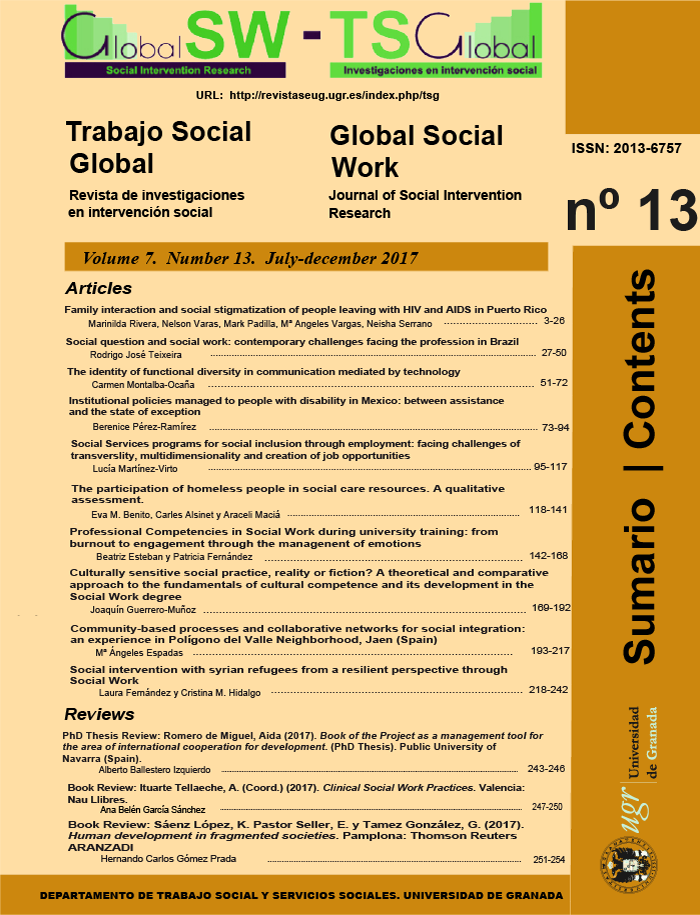Social question and social work: contemporary challenges facing the profession in Brazil
DOI:
https://doi.org/10.30827/tsg-gsw.v7i13.6300Keywords:
Brasilian Social Work, Social question, Capital and labor, Social classAbstract
This article offers an analysis of the intrinsic relationship between the social question and Social Work. The analysis of the social question starts from the meticulous and rigorous reading of the labor theory of value and the Critique of Political Economy written by Karl Marx. It is from this analysis that we try to justify the genesis of the profession linked to the role of the state and the bourgeoisie in the consolidation of monopoly capitalism. It starts from the analysis of Social Work as a profession inserted in the social and technical division of labor that by its own action, in the contradictory movement of the capitalist reality, defends the interests of capital and labor. In addition, the article presents, in a succinct way, the trajectory of Social Work in Brazil and its ethical and political project in relation to the working class challenges to guarantee this direction in times of dismantling social policies and financial capitalism.
Downloads
References
Alayón, N. (2007). Trabajo Social Latinoamericano: a 40 años de la reconceptualización. (2ª ed). Buenos Aires: Espacio Editorial.
Anderson, P. (1995). O Balanço do Neoliberalismo. Em Pablo Gentille & Emir Sader. Pós-Neoliberalismo: as políticas sociais e o Estado democrático. São Paulo: Paz e Terra.
Associação Brasileira de Ensino e Pesquisa em Serviço Social –ABEPSS- (1996). Proposta básica para o projeto de formação profissional. Revista Serviço Social e Sociedade, 50, 143-171.
Barroco, M. L. S. (2001). Ética e Serviço Social: fundamentos ontológicos. São Paulo: Cortez Editora.
Bradesco anuncia plano de demissão voluntária. (2017, 13 de junho). O Estado de S. Paulo. Recuperado de: http://economia.estadao.com.br/noticias/geral,bradesco-lanca-plano-de-demissao-voluntaria,70001888627
Castel, R. (1998). As metamorfoses da Questão Social: uma crônica do salário. Petrópolis: Vozes.
Conselho Federal de Serviço Social – CFESS-. (1993). Código de Ética Profissional do(a) Assistente Social. Brasília: CFESS.
Harvey, D. (2012) A Condição Pós-Moderna: uma pesquisa sobre as origens da mudança cultural (22ª ed.). São Paulo: Loyola.
Iamamoto, M.V. (2001). A Questão Social no Capitalismo. Revista Temporalis, 2(3), 9-32.
_______ (2007). O Serviço Social na Contemporaneidade: trabalho e formação profissional. (13ª ed.). São Paulo: Cortez Editora.
_______ (2008). Serviço Social em Tempo de Capital Fetiche: capital financeiro, trabalho e questão social. (3ª ed.) São Paulo: Cortez Editora.
_______ (2009) O Serviço Social na Cena Contemporânea. En CFESS/ABEPSS. Serviço Social: direitos e competências profissionais. Brasília: ABEPSS.
Iamamoto, M.V. e Carvalho, R. (2011) Relações Sociais e Serviço Social no Brasil: esboço de uma interpretação histórico-metodológica (33ª ed.). São Paulo: Cortez Editora.
Manrique Castro, M. (2008). História do Serviço Social na América Latina. (10ª ed)., São Paulo: Cortez Editora.
Marx, K. (2010a). O Capital: crítica da economia política. Volume I, (27ª ed.) Rio de Janeiro: Civilização Brasileira.
_______ (2010b). O Capital: crítica da economia política. Volume II, (23ª ed.) Rio de Janeiro: Civilização Brasileira.
Matos, M. C. (2013). Serviço Social, Ética e Saúde: reflexões para o exercício profissional. São Paulo: Cortez Editora.
Mota. A. E. (1995). Cultura da Crise e Seguridade Social: um estudo sobre as tendências da previdência e da assistência social brasileira nos anos 80 e 90. São Paulo: Cortez.
Netto, J.P. (1996). Transformações Societárias e Serviço Social: notas para uma análise prospectiva da profissão no Brasil. Revista Serviço Social e Sociedade, 50, 87-132.
_____ (1999). A Construção do Projeto Ético-Político do Serviço Social Frente à Crise Contemporânea. En ABEPSS/CFESS/CEAD-UnB. Capacitação em Serviço Social e Política Social: crise contemporânea, questão social e Serviço Social. Brasília: UnB
_____ (2001). Cinco Notas à Propósito da “Questão Social”. Revista Temporalis, 2(3), 41-50.
_____ (2005). Capitalismo Monopolista e Serviço Social. (4ª ed.) São Paulo: Cortez Editora.
_____ (2007). La Reconceptualización Continúa Viva, 40 años después. En: Norbert Alayón (Org). Trabajo Social Latinoamericano: a 40 años de la reconceptualización. (2ª ed.) Buenos Aires: Espacio Editorial.
_____ (2009). III CBAS: algumas referências para a sua contextualização. Em CFESS (Org.) 30 anos da Virada: começaria tudo outra vez se preciso fosse. Brasília: CFESS.
______ (2010). Ditadura e Serviço Social: uma análise do Serviço Social no Brasil pós-64. (15ª ed.). São Paulo: Cortez Editora.
Netto, J. P. e Braz, M. (2009). Economia Política: uma introdução. (5ª Ed). São Paulo: Cortez Editora.
Rosanvallon, P. (1998). A Nova Questão Social: repensando o Estado de Providência. Brasília: Instituto Teotônio Vilela.
Santos, J. S. (2007). Neoconservadorismo Pós-Moderno e Serviço Social Brasileiro. São Paulo: Cortez Editora.
Yazbek, M. C. (2009). Fundamentos Históricos e Teórico-metodológicos do Serviço Social. En CFESS/ ABEPSS. Serviço Social: direitos e competências profissionais. Brasília: ABEPSS.
Downloads
Published
How to Cite
Issue
Section
License
Authors publishing in this journal agree to the following terms:
- Authors retain their copyright. They guarantee to this journal the right to a first publication of the work submitted to initiate the editorial process.
- Authors know that their work is published under a Creative Commons License which allows others to share it, with a recognition of the work's authorship and its initial publication in this journal.
- Authors share with Global Social Work explotation rights of the work that has been published in this journal, authorizing the execution of a free reproduction, distribution and public communication. Authors know that their work will be stored on servers and reproduced in digital format for inclusion in institutional repositories and databases that will facilitates free access to the full text of the work.
- Authors may distribute the version of the work published in this journal (for example, to an institutional repository or publish it in a book), with the explicit acknowledgment of its initial publication in this journal.
Copyright on the texts published in Trabajo Social Global -Global Social Work, as well as editorial policy of the journal refering to self-file and deposit in institutional or thematic repositories, are identified in the database





















